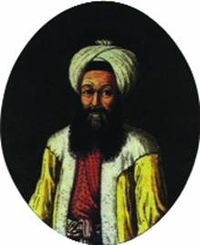
Giritli Ali Aziz Efendi
Encyclopedia

Ottoman Empire
The Ottoman EmpireIt was usually referred to as the "Ottoman Empire", the "Turkish Empire", the "Ottoman Caliphate" or more commonly "Turkey" by its contemporaries...
author of the late-18th century and he is notable for his novel "Muhayyelât" (Imaginations), a unique work of fiction blending personal and fantastic themes, well in the current of the traditional Ottoman prose, but also exhibiting influences from Western
Western world
The Western world, also known as the West and the Occident , is a term referring to the countries of Western Europe , the countries of the Americas, as well all countries of Northern and Central Europe, Australia and New Zealand...
literature.
Biography
He was born in Kandiye (CreteCrete
Crete is the largest and most populous of the Greek islands, the fifth largest island in the Mediterranean Sea, and one of the thirteen administrative regions of Greece. It forms a significant part of the economy and cultural heritage of Greece while retaining its own local cultural traits...
) as the son of Tahmisçi Mehmed Efendi, who was the defterdar
Defterdar
Defterdars were top officials in charge of the finances in the Ottoman Empire, including heads of the Ottoman provincial treasuries; they were responsible for defters....
of the Crete Eyalet, in 1749. The details on his life are rather sparse and scattered. He rose through the Ottoman hierarchy and was sent as ambassador to Prussia in 1796 and he died in Berlin
Berlin
Berlin is the capital city of Germany and is one of the 16 states of Germany. With a population of 3.45 million people, Berlin is Germany's largest city. It is the second most populous city proper and the seventh most populous urban area in the European Union...
in 1798. His burial marked also the opening of the first Turkish or Muslim cemetery in Berlin.
Muhayyelât
Consisting in three parts and written in a laconical style contrasting with its content, where djinns and fairies surge from within contexts drawn from ordinary real life situations, Ali Aziz Efendi often pursues by pulling the reader towards description of magicMagic (fantasy)
Magic in fiction is the endowing of fictional characters or objects with magical powers.Such magic often serves as a plot device, the source of magical artifacts and their quests...
and to extraordinary occurrences. Inspired by a much older story written both in Arabic and Assyrian
Akkadian language
Akkadian is an extinct Semitic language that was spoken in ancient Mesopotamia. The earliest attested Semitic language, it used the cuneiform writing system derived ultimately from ancient Sumerian, an unrelated language isolate...
, the author also displays in his work his deep knowledge of sufism
Sufism
Sufism or ' is defined by its adherents as the inner, mystical dimension of Islam. A practitioner of this tradition is generally known as a '...
, hurufism
Hurufism
Hurufism was a mystical kabbalistic Sufi doctrine, which spread in areas of western Persia, Anatolia and Azerbaijan in later 14th - early 15th century.- Foundation :...
and Bektashi
Bektashi
Bektashi Order or Bektashism is an Islamic Sufi order founded in the 13th century by the Persian saint Haji Bektash Veli. In addition to the spiritual teachings of Haji Bektash Veli the order was significantly influenced during its formative period by both the Hurufis as well as the...
traditions. Muhayyelât is considered to be an early precursor of the new Turkish literature
Turkish literature
Turkish literature comprises both oral compositions and written texts in the Turkish language, either in its Ottoman form or in less exclusively literary forms, such as that spoken in the Republic of Turkey today...
to emerge in the Tanzimat
Tanzimat
The Tanzimât , meaning reorganization of the Ottoman Empire, was a period of reformation that began in 1839 and ended with the First Constitutional Era in 1876. The Tanzimât reform era was characterized by various attempts to modernize the Ottoman Empire, to secure its territorial integrity against...
period of the 19th century. It also influenced Tanzimat literature directly when the manuscript was printed in 1867 and became a very popular book of the time. His work is re-discovered by Turkey
Turkey
Turkey , known officially as the Republic of Turkey , is a Eurasian country located in Western Asia and in East Thrace in Southeastern Europe...
's reading public rather recently and is increasingly admitted as a classic.
Ali Aziz Efendi also wrote further and shorter works of prose, which present as complementary extensions to Muhayyelât, as well as some poetry, and kept a correspondence with a number of notable figures of his time, both Ottoman and Western.
He is also cited for a short sefâretnâme
Sefâretnâme
Sefâretnâme , literally the book of embassy, was a genre in the Turkish literature which was closely related to seyahatname , but was specific to the recounting of journeys and experiences of an Ottoman ambassador in a foreign, usually European, land and capital...
he wrote relating his introduction to his mission as the ambassador of the Ottoman Empire
Ottoman Empire
The Ottoman EmpireIt was usually referred to as the "Ottoman Empire", the "Turkish Empire", the "Ottoman Caliphate" or more commonly "Turkey" by its contemporaries...
in Prussia
Prussia
Prussia was a German kingdom and historic state originating out of the Duchy of Prussia and the Margraviate of Brandenburg. For centuries, the House of Hohenzollern ruled Prussia, successfully expanding its size by way of an unusually well-organized and effective army. Prussia shaped the history...
.

